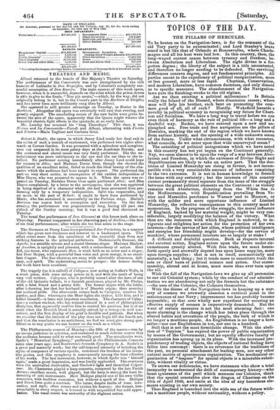TOPICS OF THE DAY.
THE PILLARS OF HERCULES.
To be beaten on the Navigation-laws, is for the remnant of the old Tory party to be exterminated ; and Lord Stanley's brave stand is but like that of Orlando at Roncesvalles, where Charle- magne and all his host were laid low. In this country, then, the long-waged contest ceases between tyranny and freedom, be- tween Absolutism and Liberalism. The right divine is a for- gotten dogma ; the liberty of the subject is a title uncontested, and therefore no longer needing to be defended. The surviving differences concern degree and not fundamental principles. All parties assent to the expediency of political reorganization, more or less general, more or less rapid. Chartism, Conservatism, and modern Liberalism, have common doctrines, and only dissent as to specific measures. The abandonment of the Navigation. laws puts the finishing-stroke to the old regime.
Are we then entering a political millennium? Is Britain really the Island of the Blessed, where dissension ceases; where man will help his brother, each bent on promoting the com- mon good of all, all of each ? Hardly. Wakefield hazards a novelty in political economy in recognizing any future for Chart- ism and Socialism. We have a long way to travel before we can even think of harmony as the rule of political life—a long and a doubtful way. Rather, we have entered upon a new and un- ploughed sea. Free trade and free navigation are the pillars of Hercules, marking the end of the region which we have known from earliest history, and the opening of a wide unknown ocean of the future. Under what circumstances, with what resources, what councils, do we enter upon that wide unsurveyed ocean? The subsiding of political antagonisms which we have noted in this country has not yet begun on the Continent generally. Nay, we seem almost to be upon the verge of a war between Abso- lutism and Freedom, in which the extremes of Divine Right and Republicanism are likely to take an active part. That the doc- trines of Limited Monarchy are rising in favour, is not incom- patible with a very considerable amount of influence remaining to the two extremes. It is not in human knowledge to foretell the issue with any certainty ; but the interests of this country cannot permanently stand separate from the issue of the struggle between the great political elements on the Continent : as victory remains with Absolutism, dictating from the White Sea to the Mediterranean, with Republicanism prevailing from Ve- nice and Marseilles perchance to Warsaw and to Moscow, or with the milder and more opportune influence of Limited Monarchy, the reflective consequences to this country must be momentous. In the progress of the struggle, the moral influence of England, backed by her material weight, might be very con- siderable, largely modifying the balance of the victory. What then are the resources with which England is endowed, to in- vigorate and enlighten her action for the protection of her own interests—for the service of her allies, whose political intelligence and energies her friendship might develop—for the service of mankind, whose permanent interests are BO largely at stake A difficult and doubtful question. Both as respects internal and external action, England enters upon the future under cir- cumstances greatly altered. With free trade, we must hence- forth openly and avowedly depend less upon home supp!ies, more upon foreign supplies : that is not in itself, commercially and materially, a bad thin.. ; but it tends more to constitute trade the sole or chief basis d'political science and action. Our states- manship, abroad and at home, must more than ever turn upon the till.
With the fall of the Navigation-laws we give up all pretension to our old Colonial system ; while by the conduct of our adminis- tration we are abandoning not only the formula but the substance —the uses of the Colonies, the Colonies themselves.
With the disuse of the Navigation-laws in keeping up a nur- sery of seamen we avowedly abandon a cardinal point in the maintenance of our Navy ; impressment too has probably become impossible; so that some wholly new expedient for securing an effective supply of seamen is imperatively demanded. But the want of certain measures is not the most alarming fact : one more alarming is the change which has taken place through the altered habits and avocations of the people, the bulk of which is no longer a maritime people. An Englishman is no longer a born sailor—nor one Englishmen in ten, nor one in a hundred. Still that is not the most formidable change. With the aboli- tion of " Toryism " has expired the power of public organization by means of the Government; but no equally effective faculty of organization has sprung up in its place. With the increased pre- ponderancy of trading objects, the objects of national feeling have fallen into contempt : there is no reverence for the traditions of the past, no personal attachment for leading men, nor any other natural motive of spontaneous organization. The mechanical or- ganization of "leagues" for special objects is a miserable substi- tute, without vitality or virtue. To crown our deficiencies, we have statesmen who show a total incapacity to understand the drift of contemporary history—who boast ignorance of the peril which menaces our Colonies, think that the special constables slew the dragon of Chartism on the 10th of April 1848, and smile at the idea of any hazardous ele- ments existing in our own society.
Thus England is launched into the wide sea of the future with- out a maritime people, without nationality, without a policy.


























 Previous page
Previous page